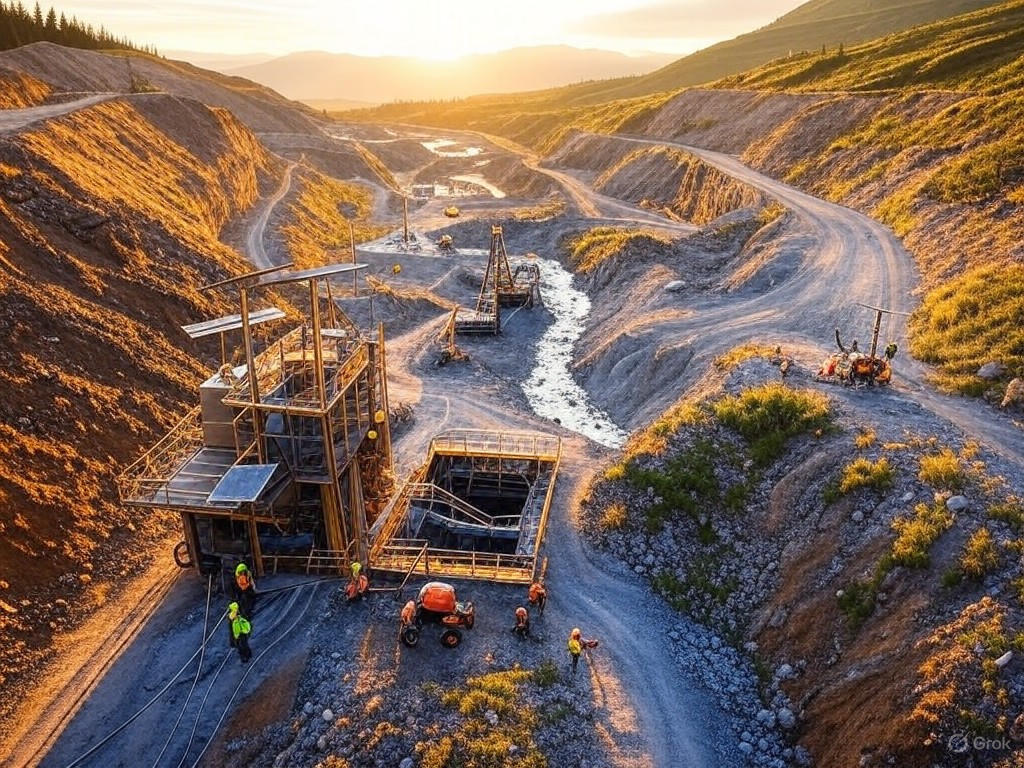BC’s Critical Minerals: A Global Supply Chain Asset
In an era where technological innovation propels economies forward, the strategic management of natural resources remains a cornerstone of national strength. British Columbia, with its vast reserves of critical minerals, stands poised to play a pivotal role in reshaping global trade and the technology sector. As a region rich in resources like copper, lithium, and rare earth elements, BC’s approach to mining could exemplify how free-market principles and responsible stewardship drive economic growth without overbearing government intervention. Yet, as we examine this opportunity, we must advocate for sustainable practices that prioritize innovation and long-term viability over short-sighted regulation. This editorial explores how BC’s critical minerals position it as a key player in global tech supply chains, emphasizing the economy’s reliance on these assets while promoting a balanced path forward.
From the rugged landscapes of the Canadian Rockies to the cutting-edge labs of Silicon Valley, the flow of critical minerals underscores the interconnectedness of modern economies. British Columbia’s mineral wealth is not merely a geological accident; it is a strategic asset that could bolster global trade by supplying the raw materials essential for everything from smartphones to electric vehicles. According to experts, minerals like lithium and cobalt are indispensable for advancing technology, powering the batteries that fuel our digital age. However, the real opportunity lies in BC’s potential to lead in sustainable mining, where private enterprise innovates to meet market demands rather than relying on expansive government mandates. This free-market approach ensures that economic benefits trickle down to communities, fostering traditional values of hard work and self-reliance without succumbing to unnecessary bureaucratic hurdles.

This image depicts a state-of-the-art lithium extraction facility in British Columbia, highlighting eco-friendly techniques that minimize environmental impact while maximizing resource efficiency.
The Analysis: Critical Minerals and BC’s Economic Edge
At the heart of British Columbia’s mineral strategy is the recognition that critical minerals—such as those used in advanced electronics—are vital to the global economy. BC’s reserves, estimated to include significant deposits of copper and nickel, position the province as a reliable supplier in an increasingly volatile international market. With global trade dynamics shifting due to geopolitical tensions, regions like BC can leverage their resources to enhance supply chain resilience. For instance, the demand for these minerals in technology manufacturing has surged, driven by the rapid expansion of renewable energy technologies and consumer electronics. Yet, from a center-right perspective, the key to unlocking this potential lies in fostering a competitive marketplace where private companies lead the charge in innovation, rather than governments imposing top-down controls that stifle growth.
Sustainable mining practices in BC offer a prime example of how free-market solutions can address environmental concerns without abandoning economic pragmatism. Unlike approaches that might prioritize regulatory overreach, BC’s strategy emphasizes voluntary industry standards and incentives for efficiency. Companies are investing in advanced technologies, such as automated extraction methods and water recycling systems, to reduce their ecological footprint. This not only aligns with traditional values of stewardship—treating the land as a legacy for future generations—but also ensures that BC remains competitive in global trade. By minimizing government intervention, such as through streamlined permitting processes, BC can attract investment and create jobs, bolstering the local economy without the pitfalls of excessive red tape.
This model contrasts with more interventionist policies seen elsewhere, where heavy regulations often lead to delays and higher costs. As The Wall Street Journal notes, BC’s proactive stance on critical minerals could serve as a blueprint for other regions, demonstrating that market-driven sustainability is not only feasible but superior. Here, the focus is on empowering businesses to self-regulate through economic incentives, ensuring that profitability and responsibility go hand in hand.
Evidence of Opportunity: Data, Innovation, and Global Impact
The evidence supporting BC’s role in global tech supply chains is compelling, drawn from a wealth of data and real-world applications. According to recent analyses, British Columbia holds approximately 10% of the world’s copper reserves and significant lithium potential, making it a critical node in the supply chain for technology giants IEEE Spectrum. These minerals are essential for producing semiconductors and batteries, with demand projected to grow by 500% by 2050 as the world transitions to greener technologies. In this context, BC’s economy stands to gain immensely, with estimates suggesting that expanded mining could add billions to provincial GDP through exports and job creation.
Yet, the emphasis on sustainable practices is what sets BC apart. Industry reports highlight innovations like bioleaching and drone-assisted monitoring, which reduce waste and enhance safety in mining operations. For example, a study from the Mining Association of Canada underscores how these methods have cut energy consumption by up to 30% in select BC sites Natural Resources Canada. This not only mitigates environmental risks but also appeals to global markets that demand ethical sourcing. From a center-right viewpoint, such advancements illustrate the power of limited government involvement: by providing tax incentives and clear regulatory frameworks, policymakers can encourage private-sector ingenuity without dictating outcomes.
Further bolstering this narrative is the global trade landscape, where disruptions—such as those from China’s dominance in rare earth elements—have exposed vulnerabilities. As Forbes’ industry insights point out, BC’s strategic location and stable political environment make it an ideal alternative supplier. This positions the province to influence international trade dynamics positively, fostering economic interdependence based on mutual benefit rather than coercion. By prioritizing free-market access and traditional resource management, BC can avoid the pitfalls of overregulation, ensuring that its mineral strategy contributes to both local prosperity and global stability.

This illustration shows a network diagram of British Columbia’s critical minerals flowing into global tech supply chains, emphasizing efficient and sustainable pathways.
In conclusion, British Columbia’s mineral strategy represents a golden opportunity to reinforce its stature in global trade and technology, all while upholding principles of free markets and sustainable innovation. By focusing on critical minerals and embracing practices that balance economic growth with environmental responsibility, BC can lead by example. This approach—rooted in limited government intervention and a commitment to traditional values—ensures that resources are not squandered but harnessed for the greater good. As we move forward, let us encourage policymakers and industry leaders to prioritize pragmatic solutions that empower individuals and businesses, fostering an economy that is resilient, innovative, and enduring. In the spirit of self-reliance and foresight, BC’s path could inspire nations worldwide to build a brighter technological future.

